The MIAS Blog: News and Views about Ibn Arabi
More Recent Posts
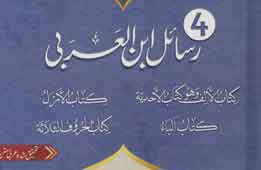
Rasail Ibn al Arabi – new editions
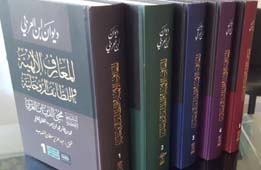
Critical Edition of Ibn ‘Arabi’s Diwān
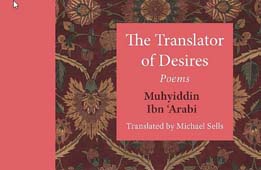
Translator of Desires – Michael Sells
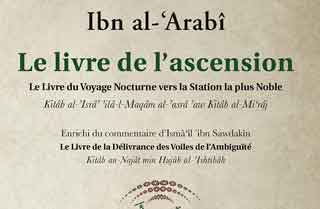
Ibn al-‘Arabî – Kıtâb al-’Isrâ
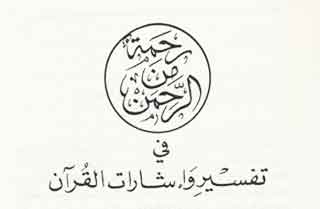
Shaykh Mahmud Ghurab
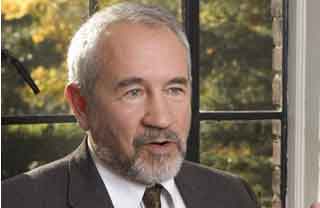
From Chapter 52 of the Futūhāt
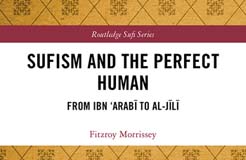
Sufism and the Perfect Human

Michel Chodkiewicz – A Legacy
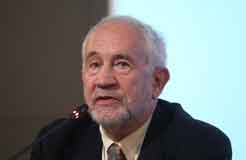
Discovering Compassion
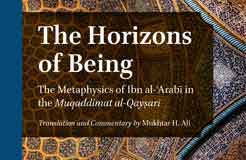
The Horizons of Being
The Openings Revealed in Makkah, Volume 3
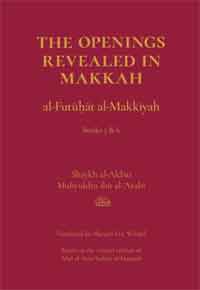
Eric Winkel says in his introduction to Volume 3:
“With Volume 3 (Books 5 & 6) we continue in the first of the six sections of the Openings Revealed in Makkah: the maʿārif (sg. maʿrifah, recognition). These are the truths we need to recognize, and here we begin the chapters on the legal understanding (fiqh) of the sharìʿah (the Law, the way to the water). Ibn al-ʿArabī is moving through the long list of ‘legal issues’ as a way to provide his audience the insights needed to recognize the work of God in the Kingdom – the sub-title of the Openings: On Recognition of the Mysteries of the King and the Kingdom.”
Volume 3 contains
Book 5
Chapter 65: On maʿrifah of the Garden, and her houses, and her steps, and what is connected by this chapter.
Chapter 66: On maʿrifah of a secret of the Law (sharìʿah, f), outwardly and inwardly, and which Divine name brought her into being.
Chapter 67: On maʿrifah of No god but God, Muḥammad is the Messenger of God.
Chapter 68: On maʿrifah of mysteries of purity.
Book 6
Chapter 69: On maʿrifah of mysteries of prayer (this chapter is completed in Book 7, part of the following volume).
Chapter 67, which is entitled “On maʿrifah of No god but God, Muḥammad is the Messenger of God”,) is the first of a series of chapters on the “pillars of Islam” – prayer, charity, fasting, pilgrimage, and pronouncing, “no god but God, Muhammad is a messenger of God.”
These chapters will extend over three volumes from Volume 3 to the end of Volume 5 and possibly into Volume 6, so are a significant portion of the Futuhat physically as well as by meaning. A sample extract from this volume has been added to the Futuhat Project web pages on this website. This consists of the first 20 pages of Chapter 68: On maʿrifah of mysteries of purity.
Ibn ‘Arabi likens faith to a house. The doorway of the house has two door panels, which are the pronouncing of the two testimonies. Prayer, charity, fasting, and pilgrimage are the four pillars of the house (p. 74 of the sample extract). This house, built continuously in this life, will protect the believer in the life to come. He says that since ṭahārah (the process of becoming clean, pure; ablution) is a condition for the validity of the ṣalāt (prayer), it is given a chapter for itself before the chapter on prayer.
The volume begins with two chapters which pave the way for the chapters on the mysteries of the acts of worship.
Chapter 65, which is entitled “On maʿrifah of the Garden [al-jannah], and her houses, and her steps”, is the last of a series of chapters on aspects of the afterlife: the intermediary world (barzakh), Jahannam (Gehenna, the place of suffering), the Day of Arising. The “Garden of deeds” is one of the three gardens, and the chapters that follow are about actions and their meanings.
In the case of Chapter 66, “On maʿrifah of a secret of the Law (sharìʿah, f), outwardly and inwardly, and which Divine name brought her into being,” its relation to what follows seems obvious. The approach is quite different from what might be imagined.
Many readers may not have come across this kind of writing by Ibn ‘Arabi previously, though Eric Winkel himself translated one chapter in 1995, and all six chapters were translated into English by Aisha Bewley from 2002.
Many readers may not be familiar with the concept of fiqh mentioned above, and may like to look at the article by Eric Winkel wich appeared in the Society Journal in 1993, Ibn ‘Arabi’s Fiqh: Three Cases from the Futūhāt.
In a passage of the chapter on purity (ṭahārah) Ibn ‘Arabi explains something about how his approach here is similar to and differs from scholars of the sharìʿah.
“So let us start, God willing, with her principles [the principles of ṭahārah]. It is that we consider her obligation. And upon whom is she obligatory? And when is she obligatory? And about her acts? And with what are the acts done? And about her being made deficient (e.g. when does someone become unclean?). And about the description of things which are done for her sake. All this is just as do the scholars of the sharìʿah and as they establish her in their books. But they are fenced in concerning this matter of ṭahārah, while we will consider that outwardly and inwardly. Indeed, I will advance it outwardly so far that the scholar studying ṭahārah will not need the books of the legal scholars, and what we cite about it will more than suffice… I will not concern myself with the principles of jurisprudence, nor with demonstrated proofs. It is not the lot of the general population to consider proof. We, we shall cite the matrices of the branches of the rulings, and the schools and legal positions of the people about them…” (pp. 75-76).
In short, he will aim at a thorough treatment of rulings about the details of the “worship acts” which are followed by different parts of the Islamic community, taking note of the different conclusions that experts have reached over time. But it will not be “academic”, and he will consider the inward aspect of these actions, which others do not.
A foretaste Ibn ‘Arabi gives of what he will show in the chapter on ṭahārah is: “Thus, ṭahārah of the sight, for example, in the inward is the considered looking at things by the principle of lessons to be learned, and by one’s essential eye so one will not send one’s sight capriciously. Something like this will not be for anyone but someone who verifies for himself through putting into operation the ṭahārah set by Law f in all her contexts.” (p. 77)
Although this will be a thorough treatment of the rulings, it seems that this is the opposite of a rulebook. It could perhaps be seen as an examination of examples from the life of a person who faces the Real hour by hour, minute by minute, in the light of revelation and the statements and reported actions of the Prophet Muhammad (SA) ‒ examples pointed out by a person who sees the physical action and its reality in a unified vision.
Because of the nature of such examples, something a correspondent said rings true:
“There’s a specific attitude that he [Ibn ‘Arabi] has to everything, an attitude that is palpable and gradually communicates itself to you as a reader. He looks at everything from a very high viewpoint, deeply rooted in what is most important. ‘Breathing’ this attitude page after page gradually transforms the reader. This is even more important than the specific details of this or that issue under discussion. He is teaching not just forms, or only forms, but a way of being.”
Ibn ‘Arabi is, “repeatedly providing his ‘bridges’ to the inner meaning of outer forms. For almost every seemingly insignificant detail of behaviour, he provides a bridge to open into the deeper meaning and significance of the form. And he often justifies several opposing positions at the same time, saying this is correct and means this if you look at it this way, and that is correct and means that if you look at it that way.”
Volume 3 of The Openings Revealed in Makkah is launched on June 23rd 2021. It is published by Pir Press, New York.
There is information about the Futuhat Project on this website.
Eric Winkel

Having studied Ibn Arabi’s Futuhat al-Makkiyya for over twenty-five years, Eric Winkel is now in the midst of an eleven-year project to produce the first complete translation of this work. For more information see links below to The Futūḥāt Project
The Futūḥāt Project
Articles by Eric Winkel
Abu Madyan’s Child, Per Singular Momenta and the Skull Suture: Understanding Ibn Arabi’s Futuhat
Understanding, and Translating, the Futuhat al-Makkiyya
Ibn Arabi’s fiqh: Three Cases from the Futuhat
Time Is Not Real: Time in Ibn Arabi, and from Parmenides (and Heraclitus) to Julian Barbour
Podcasts by Eric Winkel
Abu Madyan’s Child, Per Singular Momenta and the Skull Suture: Understanding Ibn Arabi’s Futuhat
